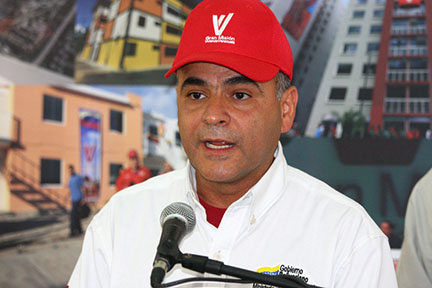CARACAS, (Reuters) – Venezuelan President Nicolas Maduro yesterday tapped a National Guard major general to lead state oil company PDVSA and the Oil Ministry as the OPEC member labors under near 30-year lows in oil production.
Industry analysts and sources said the surprise appointment of Manuel Quevedo, a former housing minister with no known energy experience, was a bad omen for the country’s already deteriorated oil industry.
Quevedo takes over from two industry veterans to become one of the most powerful players in the country, which is home to the world’s largest crude reserves. He will have to tackle corruption scandals and an attempted debt restructuring, within the context of a deep recession and debilitating U.S. sanctions.
“The time for a new oil revolution has come,” leftist Maduro said in his televised Sunday address, urging Quevedo to purge PDVSA of corruption.

Last week, six executives from U.S.-based Citgo Petroleum Corp, or Citgo, a Venezuelan-owned refiner and marketer of oil and petrochemical products, were arrested in Caracas on graft allegations.
About 50 officials at state oil company PDVSA have been arrested since August in what the state prosecutor says is a “crusade” against corruption.
Sources within PDVSA and the oil industry said Maduro’s administration was using corruption allegations to sideline rivals and deepen its control of the industry, which accounts for over 90 percent of export revenue.
Quevedo, whom two sources close to the military identified as a Maduro ally, will take over his new roles today before he is officially sworn in tomorrow. He vowed yesterday to bring PDVSA closer to the ideals of late leftist leader Hugo Chavez.
”We’re going to turn PDVSA into the sacred temple of the people!“ tweeted Quevedo, who Maduro said would still dedicate 20 percent of his time to the “Grand Housing Mission,” a Chavez-era project.
It was unclear how Quevedo planned to increase oil production, or what position he would have in Venezuela’s complex attempt to restructure its debt, although his appointment is likely to worry bondholders.
A half dozen current and former PDVSA sources, who were taken aback by Quevedo’s appointment, said his arrival would likely deepen a brain drain and could complicate everything from daily operations to negotiations with bondholders.
One PDVSA source, who asked not to be named, said a PDVSA board reshuffle was due in the next few days.
Quevedo’s rise also highlighted the increasing power of the Venezuelan military, which has gained clout in Maduro’s Cabinet and in key industries like mining and food distribution.
While military appointments had also been increasing in the oil industry, PDVSA so far had been led by chemist Nelson Martinez and the Oil Ministry by engineer Eulogio Del Pino.
“The military has achieved its aim of controlling PDVSA. The forecast is somber,” said Francisco Monaldi, a fellow in Latin American energy policy at the Baker Institute in Houston, echoing much of the mood in the local oil industry.
Quevedo also faces accusations from the opposition of violating human rights during the National Guard’s handling of anti-Maduro protests.
U.S. Senator Marco Rubio, a vocal critic of Maduro, had included Quevedo on a 2014 list of Venezuelan officials who should be named in U.S. sanctions, although Quevedo does not appear in the list released by the U.S. Treasury Department.
”This is a game changer for international oil companies. If political and reputational risk could get any higher for oil companies, this is it,” said Raul Gallegos, an analyst with the consultancy Control Risks.
PDVSA is closely allied with Russian state oil giant Rosneft and state-owned oil major China National Petroleum Corp, although Western oil companies like U.S. major Chevron and France’s Total also operate in Venezuela.





